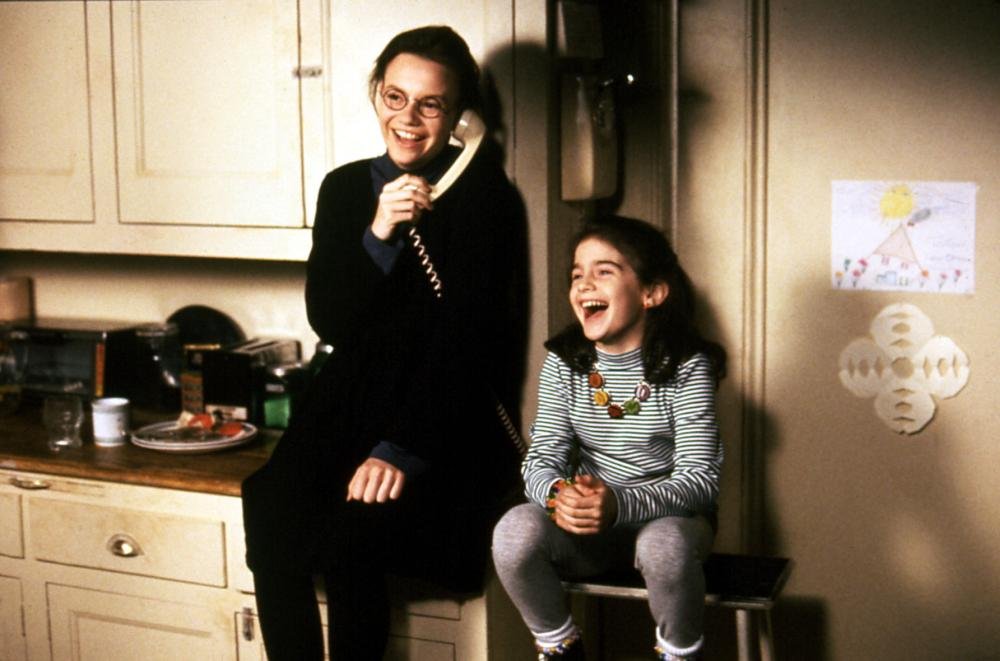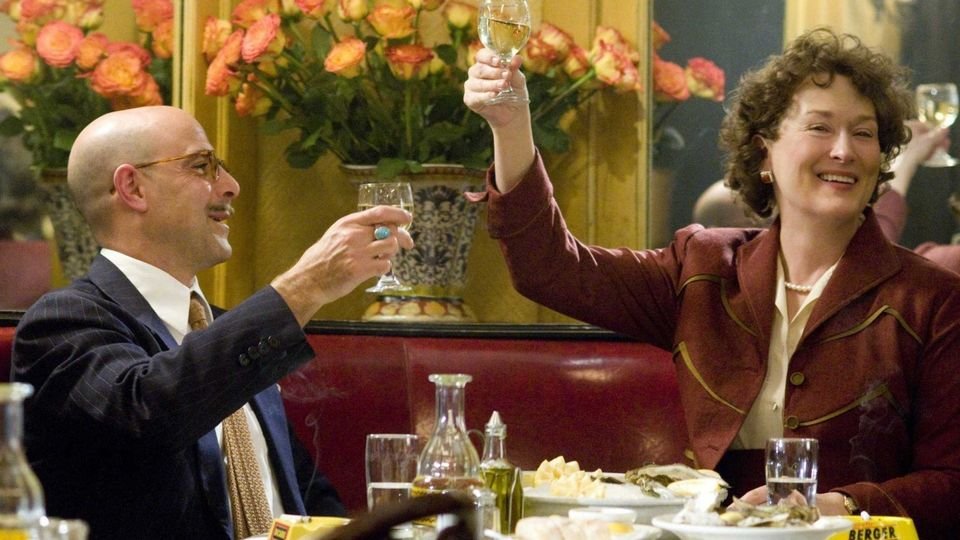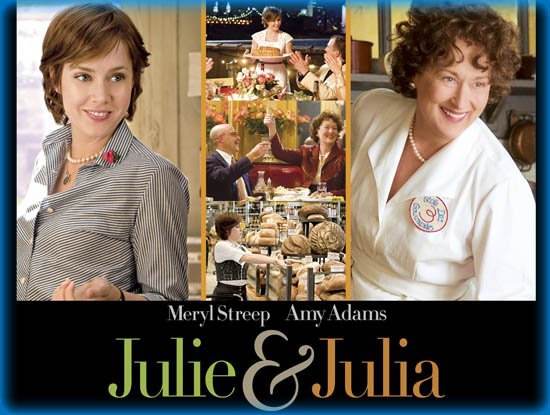First and Last 2.0 Nora Ephron: This Is My Life (1992) and Julie & Julia (2009)
Nora Ephron began and ended her directorial career with comedy-dramas about ordinary women whose uncommon ambition lift them to dizzying, disorienting heights of fame and stardom. That’s a world Ephron was intimately familiar with. Ephron’s parents were both Oscar-nominated screenwriters, her screenwriter sister Delia was one of her most important collaborators and at various points in her life Ephron was married to Watergate journalist Carl Bernstein and Nicholas Pileggi, the author of Wise Guy: Life in a Mafia Family, the book that inspired Goodfellas.
By the time Ephron made her directorial debut with This Is My Life, a 1992 adaptation of Meg Wolitzer’s novel of the same name, she’d already achieved considerable success in a series of fields dominated by men. The beloved auteur made her name as a journalist, then segued smoothly into writing books, both fiction and non-fiction and, in 1983’s Heartburn, a semi-autobiographical novel about her relationship with ex-husband Bernstein, a combination of the two.
Ephron adapted Heartburn as a Mike Nichols film starring Jack Nicholson and Meryl Streep in the lead roles in 1986. By that point she’d already made her debut as a screenwriter with the critically acclaimed 1983 drama Silkwood, which scored Cher an Oscar nomination for Best Supporting Actress.
(Borat voice)
The groundbreaking feminist writer, playwright and screenwriter scored her own Oscar nomination for her endlessly quotable, instantly iconic screenplay for 1989’s When Harry Met Sally. So when Ephron assumed the director’s chair with a modestly budgeted literary adaptation starring a woman best known for voicing a beloved cartoon housewife, she was a newcomer to film directing but a distinguished veteran when it came to telling stories that connected with readers and moviegoers alike.
To help tell this story of sisterly love and maternal devotion, Ephron recruited her own sister and frequent collaborator Delia to co-write the screenplay, and Carly Simon, who wrote and performs a soundtrack full of achingly sensitive story songs that reflect the emotions and themes of the movie snugly and powerfully. This Is My Life is a tear-jerker worthy of its title, and for all of the Ephrons’ masterful work and the work of a terrific cast, Simon’s songs do a lot of the tear-jerking.
In a rare starring turn, national treasure Julie Kavner is charming and irresistible as Dottie, a single mother to two complicated daughters: plain and resentful teenager Erica (a successfully de-glammed Samatha Mathis) and her younger daughter Opal (Gaby Hoffman). During the day Dottie transforms her job working the make-up counter at Macy’s into a make-shift comedy club with her customers as an indulgent and appreciative audience. By night Dottie pursues a career as a stand-up comedian, drawing material from her own life as a single mother. When a relative dies and leaves her money, Dottie finally has resources to chase her dreams full-time.
Movies about stand-up comedians often suffer from an intense, sometimes hilarious disconnect between how popular and successful a comedian is supposed to be and the actual quality of their material, which generally runs the gamut from mediocre to egregiously, distractingly awful. A good example can be found in the fascinatingly tone-deaf 2015 Robert De Niro vehicle The Comedian.
De Niro’s prickly veteran stand-up is treated like a cross between the second coming of George Carlin and a contemporary Mark Twain. Yet the material we’re cursed to see, and De Niro’s delivery, suggest that in real life he’d get rejected from even the most undiscriminating open mics.
The same, thankfully, is not true of Kavner and Dottie. Anyone who has seen The Simpsons or The Tracy Ullman Show knows how impeccable Kavner’s timing and delivery are, how she’s able to get the very most out of some of the best TV writing of all time. The surprise here is that Dottie’s material is just as good as her delivery. It’s slick and polished without seeming glib or hacky and ingratiatingly personal without veering into The King of Comedy/Joker-style psychodrama.
It’s easy to see how Dottie, with her girl-next-door relatability, unthreatening aura and confident stage presence could appeal to gate-keepers who might be threatened by angrier or less accessible female comedians.
Dottie makes her way up the ladder of East Coast stand-up success. In the process she engenders both the support and the lingering resentment of both children concerned that her career will take her away from them and a coterie of fellow small-time comedians played by the likes of real-life prop comic Bob Nelson and heavyweight thespian Tim Blake Nelson, who are so intensely competitive and envious that they can’t even bring themselves to pretend to be happy for Dottie and her success because it is, by definition, her success and not theirs.
Dottie’s thriving career attracts the attention of hotshot agent Arnold Moss (Dan Aykroyd), who is successful enough that people happily ignore his curious predilection for eating paper, and his assistant Claudia Curtis, who a scene-stealing Carrie Fisher plays as a profoundly, hilariously inappropriate human being who treats Opal and Claudia like middle-aged confidantes rather than kids.
Erica begins the film worried that the demands of show-business will take away the only parent she’s ever really known. As the film progresses, Dottie grows increasingly successful, and in demand. Dottie’s professional dreams double as her daughters’ worst nightmares but This Is My Life refreshingly does not punish Dottie for her professional ambition and need for a life outside of her home, nor does it punish Erica for experiencing ugly emotions about her mother’s success.
This Is My Life is a film of profound empathy and compassion. It’s rare and wonderful for a movie to both love and understand its characters this intensely, though a third-act turn towards family melodrama hits a few sour notes and introduces unnecessary subplots and conflicts involving the girls’ long-absent father.
This is My Life is a love story of a different kind. It’s not about romantic love but rather about the bond between a mother and her daughters, a connection so tender and powerful and all-important that stardom, geography and the demands of the road can test it but it cannot hope to destroy it.
There are no bad guys in This Is My Life. Even Dottie’s ex-husband, the deadbeat father of her two children, is treated with compassion. He may be a schmuck and a bad, negligent father, but just like everyone here he’s human and deserves to be treating with dignity for that alone.
Ephron’s subsequent directorial efforts would all be bigger and better known than her winningly modest debut (even flops like Mixed Nuts and Lucky Numbers) but this keenly observed, warm and gloriously lived-in comedy-drama ranks among her very best, if least seen work as a director.
The beloved writer and wit ended her directorial career way too early with 2009’s Julie & Julia, an adaptation of both Julia Child’s My Life in France and Julie Powell’s Julie & Julia: 365 Days, 524 Recipes, 1 Tiny Apartment Kitchen that’s confusingly and frustratingly a very good movie and also a very bad movie.
The film’s conceit is as audacious as it is ultimately unsuccessful and self-defeating: to combine the overlapping stories of Julie Powell (Amy Adams), a bored and under-employed cubicle drone who finds herself and her voice as a writer and cook when she decides to make and write about every single recipe in her hero Julia Child’s seminal cookbook Mastering the Art of French Cooking for an online project in the long, ominous shadow of post-9/11 New York with that of Child as she studies at the prestigious cooking school Le Cordon Bleu and discovers that she has a passion and a talent for cooking that would make her a towering culinary icon.
The idea is to explore the way these similarly monikered women’s lives echoed and paralleled each other, to illustrate how Child’s strength, vision and indomitable faith in herself and her abilities empowered a depressed, discouraged writer half a world away to be her best self by embracing the Julia Child within.
These stories are as unequal as their subjects. The absolutely captivating Julia Child half of the film unforgettably captures Child’s warmth, humor and irrepressible, infectious love of life as she and her soulmate husband Paul (Stanley Tucci) overcome sexism, McCarthyism and the snobbiness of the French culinary establishment to kick-start a one-woman revolution in cooking that would make her a household name the world over. The deeply irritating Julie Powell half of the film, in sharp contrast, chronicles how an annoying blogger successfully followed directions for a period of 365 days.
One accomplishment is a whole lot more impressive than the other. Julie & Julia’s intermittent attempts to put its subjects on similar, or equal footing only underline how Child’s life was so vast and rich and complex that it can’t help but make Julie’s life seem insignificant and irrelevant by comparison.
Like This Is My Life, Julie and Julia sensitively explores a different kind of love story than the ones we’re used to seeing onscreen. Julia and her utterly and rightfully adoring husband are middle-aged, married and not exactly Richard Burton and Elizabeth Taylor when it comes to looks but they burn for each other with the heat, passion and sexual intensity of teenagers who’ve just discovered love and sex in one fell swoop.
It’s hard to over-state the explosiveness of Streep and Tucci’s marvelously middle-aged chemistry. For them, marriage is so much more than companionship and support: it’s bliss. It’s ecstasy. It’s something that makes them smile like lovestruck kids whenever they’re together. This isn’t just an unusually satisfying partnership: it’s a goddamn love story for the ages.
The depth and beauty of Paul and Julia’s relationship can’t help but make the marriage between Julie and bland husband Eric (Chris Messina) seem even flimsier and more inconsequential by comparison. Ephron’s lopsided screenplay doesn’t give Julie’s husband anything to do other than be supportive and enjoy his suddenly inspired wife’s rich cooking for most of the film and then to get frustrated and storm out for the sake of third-act conflict that feels empty and contrived. As his wife’s rock and a damn impressive human being in his own right, Tucci is absolutely wonderful, with a quiet bravery to match his wife’s. Messina, in contrast, is just some guy.
Julie writes like she talks, with a self-satisfied smirk. Julie and Eric are supposed to be struggling writers reduced by circumstances to living in an apartment above a pizza place in Queens but this is a Nora Ephron movie so they live in an absolutely huge, beautiful apartment, particularly for a childless couple without any animals, out of a glossy spread in a home design magazine.
When Julie discovers that her great culinary hero and role model didn’t particularly care for her or what she saw as a cheap, publicity-grubbing stunt it should be devastating for the audience as well as Julie. Instead it’s unexpectedly satisfying, a defiantly crowd-pleasing moment where one of the all-time greats uses her power and influence to swat down a glib pretender.
Julie & Julia maddeningly melds a story (Julia’s) that deserves two hours of screen time with a story (Julie’s) that does not merit being made into a movie at all.
Ephron’s directorial career ended with some of the very best work of her career, in any medium in the form of the Julia Child half. Unfortunately, in the Julie Powell half, it also contained some of the very worst as well. Julie & Julia ruins an excellent Julia Child biography with a whole bunch of nonsense about an egotist’s love affair with herself and the sound of her own literary voice.
The Julie half is so bad that it suggests the movie should be split in two, like the two halves of Quentin Tarantino and Robert Rodriguez drive-in movie double feature Grindhouse so audiences can experience the greatness of Nora Ephron’s writing and direction and Meryl Streep and Stanley Tucci in perfectly cast roles without having to waste an hour on the tedious doings of a self-absorbed narcissist who likes to cook.
Buy The Weird Accordion to Al and The Weird A-Coloring to Al here: https://www.nathanrabin.com/shop or from Amazon here
Missed out on the Kickstarter campaign for The Weird A-Coloring to Al/The Weird A-Coloring to Al-Colored In Edition? You’re in luck, because you can still pre-order the books, and get all manner of nifty exclusives, by pledging over at https://the-weird-a-coloring-to-al-coloring-colored-in-books.backerkit.com/hosted_preorders
Pre-order The Joy of Trash, the Happy Place’s upcoming book about the very best of the very worst and get instant access to all of the original pieces I’m writing for them AS I write them (there are NINE so far, including Shasta McNasty and the first and second seasons of Baywatch Nights) AND, as a bonus, monthly write-ups of the first season Baywatch Nights you can’t get anywhere else (other than my Patreon feed) at https://the-joy-of-trash.backerkit.com/hosted_preorders
AND of course you can also pledge to this site and help keep the lights on at https://www.patreon.com/nathanrabinshappyplace










